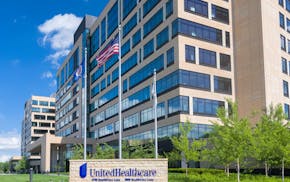Possis Medical Inc. said Monday it has agreed to be acquired by German health care giant Bayer AG for $361 million in cash.
Investors in the Coon Rapids-based company, which makes a device that removes blood clots from arteries, will receive $19.50 per share, which represents a 39 percent premium over Possis' average closing price over 30 days prior to last Friday. The deal is expected to close in the first quarter.
Possis shares jumped 35 percent, or $5.01, to close Monday at $19.36.
The company is the fourth major medical company in Minnesota to be sold in recent months, a list that includes MGI Pharma Inc. ($3.6 billion), AppTec Laboratory Services Inc. ($160 million), and Lifecore Biomedical Inc. ($202 million).
Despite the rocky economy, medical companies still attract plenty of investor interest, said Jay Hare, a partner at accounting firm PricewaterhouseCoopers' technology industry group in Minneapolis. These companies have truly innovative technology and serve an unmet need in the market -- especially for strategic buyers, he said.
In a conference call with investors, Possis Chief Executive Robert Dutcher said he expects "minimal changes" at Possis, which employs 280 workers including 193 in Minnesota.
Dutcher said the businesses of Possis and Medrad Inc., the Bayer subsidiary that Possis will join, are highly complementary. While Possis manufactures devices to treat blood clots, Medrad's technology focuses on detecting coronary diseases. With both companies selling to the same customers, the combined sales force will "offer a broader, more comprehensive suite of products," Dutcher said.
"The proposed deal will capitalize on both companies' strengths and create a formidable cardiovascular portfolio," he said.
Dutcher also noted that Medrad's global distribution network will allow Possis to reach a largely untapped global market. International sales accounted for only three percent of Possis' total sales of $66.7 million last year.
But some investors wondered if Possis left money on the table. Had Possis waited, the company might have received a higher offer, said Ernest Andberg, an analyst with Feltl & Co. in Minneapolis.
"I just thought that 12 months from now, the success of the company would have been really, really evident," Andberg said. "The stock might have commanded a higher price."
The company has been in an upswing ever since a disastrous clinical study sunk the stock from $35 a share to below $10 a share in 2004. In that year, Possis released unexpectedly negative results that showed its core product, a blood-clot-busting device called AngioJet, failed to demonstrate any benefits to patients when combined with a stent.
But Possis' fortunes rebounded last year when a study in the Journal of American College of Cardiology found that removing large blood clots before using a drug-coated stent results in fewer deaths, heart attacks, and additional blood clots in some patients. The company's upgrade to AngioJet, dubbed Ultra, also generated positive buzz.
"We didn't buy (Possis stock) because we thought it would be acquired at this time," said Matt Arens, a senior portfolio manager at Edina-based Kopp Investment Advisors, which owns 348,260 shares. "We bought it because of the new Ultra product, which injected some enthusiasm back into Possis' sales force. They seemed to get their stride back."
The company probably could have received a higher offer down the road, Arens said, but given the unpredictability of the economy and stock market, investors are still getting a fair deal.
What's not known is whether Possis discussed a deal with other suitors before settling on Bayer, Arens said. Dutcher declined to discuss the details behind the acquisition except to say the company would release more information in future filings with the Securities and Exchange Commission.
Thomas Lee • 612-673-7744

UnitedHealthcare, HealthPartners reach network deal on Medicare Advantage plans in Minnesota

UnitedHealthcare loses appeal to retain Minnesota Medicaid business in 2025

Farming is more high-tech than ever. Just ask Land O'Lakes' chief technology officer.

Moorhead lands $5B sustainable jet fuel plant and its 650 jobs
